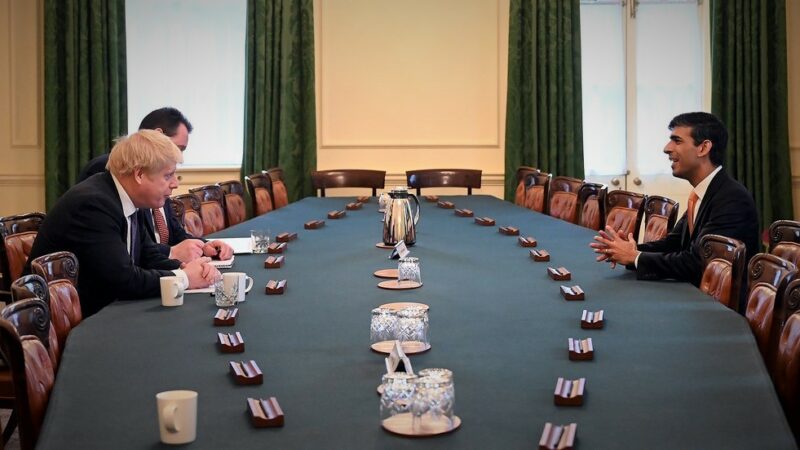The Tories sneaked a deregulation plan into this week's budget...

The Chancellor’s hastily re-written budget rightly placed the coronavirus front and centre, with 40% of the total spending package specifically targeted at measures to tackle it.
From NHS capacity to incentives and support for business and the workforce, this was a budget shaped by events, more than any in recent memory. It followed that some anticipated measures that didn’t make it into the budget statement to Parliament, appearing instead in the paperwork published shortly afterwards.
But tucked away in one recess of the budget report was the announcement of a new ‘Regulatory Reform Initiative’, an “invitation to businesses and the public to help Government ensure that regulation is sensible and proportionate now that the UK has left the EU” (section 2.267).
In place of the previously trailed Brexit Red Tape Challenge Mk II, we were instead presented with a much more nuanced, moderately presented version of the crowd-sourcing deregulatory initiative. The new Regulatory Reform Initiative website contains none of the rhetoric which underpinned previous deregulatory projects like the 2011 Red Tape Challenge, which exhorted the public to help “liberate our entrepreneurs, small businesses and consumers from overbearing bureaucracy”.
In its new iteration, participants are invited to help “improve” the system of UK regulation. Where previous deregulatory initiatives listed regulations so as to enable participants to easily select which should be thrown on the scrapheap, now, we have a simple survey.
Ostensibly, this shift in rhetoric is a welcome recasting of the government’s position in relation to regulation and of policies designed to improve it. Quite literally, the government appears to have shifted its position on the axis between regulating for business gain and regulating for public gain. On this reading, it now sits firmly in the middle, the bringer of “balance between supporting excellent business practice and providing protections for people and the environment.”
This is a view not generally associated with the current government, nor many of the key players within it. Over recent years, rhetorical efforts have focused on casting regulation as bad for business, bad for the economy, bad for Britain. From Dominic Raab’s references to “the dragging anchor of regulation, which is holding the British economy back”, to Priti Patel’s desire to “crack-on and free business from the shackles of regulation”, the default position has always been that regulation, in and of itself, is a bad thing.
In light of this apparent volte-face, are we to take from this that the government no longer sees itself as the hard-hat wearing, digger-driving liberator of “red-tape”? As ever, the devil will be in the detail. Certainly, the ideological commitment to deregulation runs deep, and successive governments have baked the necessary infrastructure deeply into Whitehall in order to bring it to fruition.
The Business Impact Target, regulatory impact assessments, the One-in-Three-Out rule; there is no shortage of existing policies designed to reduce regulatory costs for businesses, with little weight given to societal cost/benefits.
While EU-derived law is currently exempt from these kinds of initiatives, after the transition period it will be brought within their scope, subject to domestic deregulatory pressures for the first time. After months of hearing Minsters reiterate their determination to diverge from EU rules, those of us who fear a weakening of important regulations may not be fully reassured by the newly modulated tone coming out of Number 11.
And while the Regulatory Reform Initiative lacks the fully-loaded language of previous deregulatory drives, we should still ask why the preoccupation with reducing the UK’s regulatory stock remains in any form. Most regulation exists for good reasons, to fulfil objectives that are not solely economic.
Regulations have driven up living standards, protected the most vulnerable, and helped create the rights, reassurances and freedoms that we all enjoy. Plenty of evidence shows that good regulations deliver economic benefits, boost jobs and skills, and enhance the nation’s growth and competitiveness.
There is a very good chance that this exercise simply confirms what we already know: the vast majority of UK businesses and citizens support decent, well-enforced regulations. Just look at the last Red Tape Challenge. Far from releasing a baying mob of red-tape cutters, this prompted, in the words of Vince Cable, a “bombard[ment] of messages from the public saying please increase regulation.”
At a time when there is no shortage of real and pressing challenges for the Treasury to focus on, and with the coronavirus looming large, this newest initiative feels like something of a red herring. Surely better to stick to the task in hand: strengthening the protections that keep British people safe and well.
Emma Rose is Director of Unchecked.
Left Foot Forward doesn't have the backing of big business or billionaires. We rely on the kind and generous support of ordinary people like you.
You can support hard-hitting journalism that holds the right to account, provides a forum for debate among progressives, and covers the stories the rest of the media ignore. Donate today.




One Response to “Behind the budget: Are we about to witness a bonfire of social protections?”
Behind the budget: Are we about to witness a bonfire of social protections? – LeftInsider
[…] Left Foot Forward […]